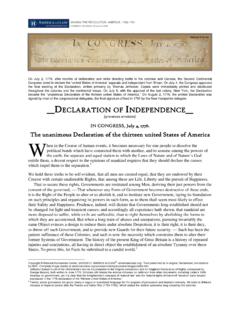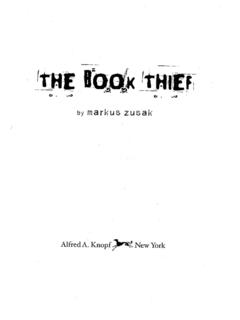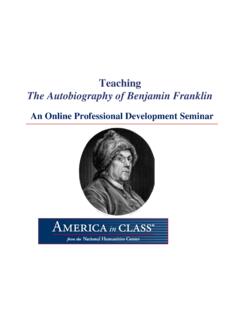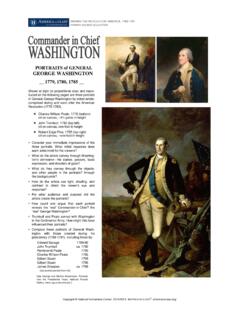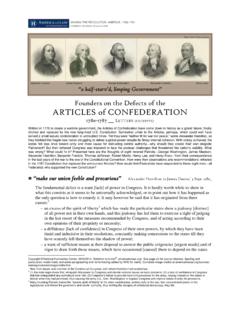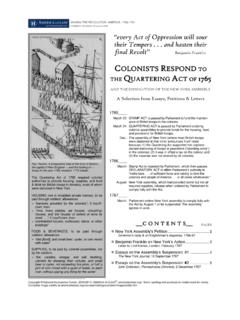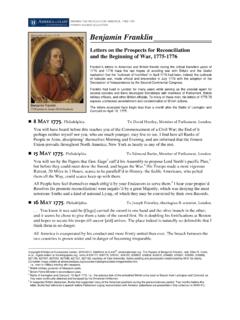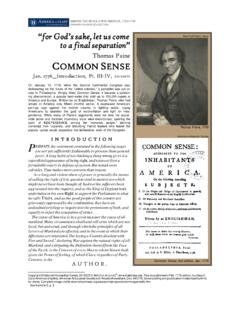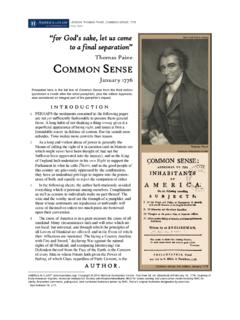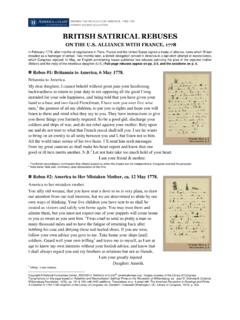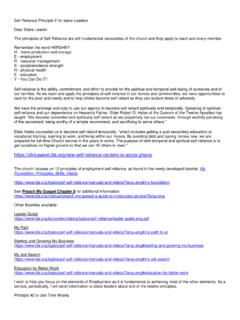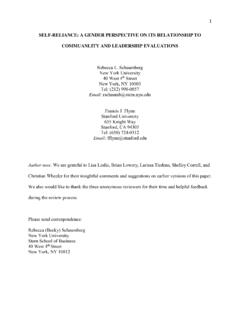Transcription of Individualism in Ralph Waldo Emerson’s “Self-Reliance”
1 Individualism in Ralph Waldo emerson s self - reliance Advisor: Charles Capper, Professor of History, Boston University; National Humanities Center FellowFraming QuestionIn his essay self - reliance , how does Ralph Waldo emerson define Individualism , and how, in his view, can it affect society? UnderstandingIn self - reliance emerson defines Individualism as a profound and unshakeable trust in one s own intuitions. Embracing this view of Individualism , he asserts, can revolutionize society, not through a sweeping mass movement, but through the transformation of one life at a time and through the creation of leaders capable of Waldo emerson , self - reliance , Waldo emerson died in 1882, but he is still very much with us. When you hear people assert their Individualism , perhaps in rejecting help from the government or anyone else, you hear the voice of emerson .
2 When you hear a self -help guru on TV tell people that if they change their way of thinking, they will change reality, you hear the voice of emerson . He is America s apostle of Individualism , our champion of mind over matter, and he set forth the core of his thinking in his essay self - reliance (1841).While they influence us today, emerson s ideas grew out of a specific time and place, which spawned a philosophical movement called Transcendentalism. self - reliance asserts a central belief in that philosophy: truth lies in our spontaneous, involuntary intuitions. We do not have the space here to explain Transcendentalism fully, but we can sketch some out its fundamental convictions, a bit of its historical context, and the way self - reliance relates to of Ralph Waldo emerson , 1878 Individualism in Ralph Waldo emerson s self - reliance A Close Reading Guide from America in Class2By the 1830s many in New England, especially the young, felt that the religion they had inherited from their Puritan ancestors had become cold and im personal.
3 In their view it lacked emotion and failed to foster that sense of connectedness to the divine which they sought in religion. To them it seemed that the church had taken its eyes off heaven and fixed them on the material world, which under the probings, measurements, and observations of sci ence seemed less and less to offer assurance of divine presence in the direction from ancient Greek philosophy and European thinking, a small group of New England intellectuals embraced the idea that men and women did not need churches to connect with divinity and that nature, far from being without spiritual meaning, was, in fact, a realm of symbols that pointed to divine truths. According to these preachers and writers, we could connect with divinity and understand those symbols that is to say, transcend or rise above the material world simply by accepting our own intuitions about God, nature, and experience.
4 These insights, they argued, needed no external verification; the mere fact that they flashed across the mind proved they were hold these beliefs required enormous self -confidence, of course, and this is where emerson and self - reliance come into the picture. He contends that there is within each of us an aboriginal self , a first or ground-floor self beyond which there is no other. In self - reliance he defines it in mystical terms as the deep force through which we share the life by which things exist. It is the fountain of action and thought, the source of our spontaneous intuitions. This self defines not a particular, individual identity but a universal, human identity. When our insights derive from it, they are valid not only for us but for all humankind.
5 Thus we can be assured that what is true in our private hearts is, as emerson asserts, true for all men. But how can we tell if our intuitions come from the aboriginal self and are, therefore, true? We cannot. emerson says we must have the self -trust to believe that they do and follow them as if they do. If, indeed, they are true, eventually everyone will accept them, and they will be rendered back to us as the univer sal sense. Until the rest of the world accepts our beliefs, however, we will be out of step; we will be nonconformists. emerson tells us not to worry. The essence of self - reliance is resistance to conformity. Indeed, non-conformity is a sign of strength: Whoso would be a man, he writes, must be a nonconformist. In a sense self - reliance can be seen as a pep talk designed to strengthen our resolve to stand up to society s efforts to make us conform.
6 Nothing, emerson thunders, is at last sacred but the integrity of your own mind. This is Individualism in the self - reliance deals extensively with theological matters, we cannot overlook its political signifi cance. It appeared in 1841, just four years after President Andrew Jackson left office. In the election of 1828 Jackson forged an alliance among the woodsmen and farmers of the western frontier and the labor ers of eastern cities. emerson opposed the Jacksonians over specific policies, chiefly their defense of slavery and their support for the expulsion of Indians from their territories. But he objected to them on broader grounds as well. Many people like emerson , who despite his noncomformist thought still held many of the political views of the old New England elite from which he sprang, feared that the rise of the Jacksonian electorate would turn American democracy into mob rule.
7 In fact, at one point in self -Contextualizing kind of text are we dealing with? what audience was it intended? what purpose was it written? was it written?5. What was going on at the time of its writing that might have influenced its composition? Individualism in Ralph Waldo emerson s self - reliance A Close Reading Guide from America in Class3 reliance he proclaims now we are a mob. When you see the word mob here, do not picture a large, threatening crowd. Instead, think of what we today would call mass society, a society whose culture and politics are shaped not by the tastes and opinions of a small, narrow elite but rather by those of a broad, diverse population. emerson opposed mass-party politics because it was based on nothing more than numbers and majority rule, and he was hostile to mass culture because it was based on manufactured entertainments.
8 Both, he believed, distracted people from the real questions of spiritual health and social justice. Like some critics today, he believed that mass society breeds intellectual mediocrity and conformity. He argued that it produces soft, weak men and women, more prone to whine and whimper than to embrace great challenges. emerson took as his mission the task of lifting people out of the mass and turning them into robust, sturdy individuals who could face life with confidence. While he held out the possibility of such transcendence to all Americans, he knew that not all would respond. He assured those who did that they would achieve greatness and become guides, redeemers, and benefactors whose personal transformations and leadership would rescue democracy. Thus if self - reliance is a pep talk in support for nonconformists, it is also a manual on how to live for those who seek to be individuals in a mass self - reliance as a pep talk and a manual re-enforces the way most people have read the essay, as a work of affirmation and uplift, and there is much that is affirmative and uplifting in it.
9 Yet a careful reading also reveals a darker side to emerson s self - reliance . His uncompromising embrace of nonconformity and intellectual integrity can breed a chilly arrogance, a lack of compassion, and a lonely isolation. That is why one critic has called emerson s work deeply unconsoling. 1 In this lesson we explore this side of emerson along with his bracing word about our presentation. Because readers can take self - reliance as an advice manual for living and because emerson was above all a teacher, we found it engaging to cast him not as Ralph Waldo emerson , a nineteenth-century philosopher, but as Dr. Ralph , a twenty-first-century self -help guru. In the end we ask if you would embrace his approach to life and sign up for his Louis Menand, The Metaphysical Club (New York; Farrar, Straus, and Giroux, 2001) p.
10 AnalysisParagraph 1[1] I read the other day some verses written by an eminent painter which were original and not conventional. [2] The soul always hears an admo-nition in such lines, let the subject be what it may. [3] The sentiment they instil is of more value than any thought they may contain. [4] To believe your own thought, to believe that what is true for you in your private heart is true for all men, that is genius. [5] Speak your latent conviction, and it shall be the universal sense; for the inmost in due time becomes the outmost, and our first thought is rendered back to us by the trum-pets of the Last Judgment. [6] Familiar as the voice of the mind is to each, the highest merit we ascribe to Moses, Plato, and Milton is, that they set at naught books and traditions, and spoke not what men but what they thought.
